Plenary Lectures
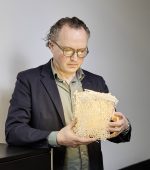
Bruno Weber
University of Zurich, Institute of Pharmacology & Toxicology, Zürich, Switzerland
L01: Powering the brain
Tuesday, 8 July 2025
Bruno Weber trained at the University of Zurich and was a postdoctoral fellow at the Max Planck Institute in Tübingen before starting his own laboratory as an assistant professor back in Switzerland. He is now Full Professor and Director of the Institute of Pharmacology and Toxicology at the University of Zurich. His group uses a variety of imaging tools to study the neuron-glia-vascular communication pathways involved in energy metabolism and blood flow regulation in the cerebral cortex. Furthermore, his team is working to dissect the interaction of neurons and astrocytes with the vascular system, which is responsible for maintaining an adequate supply of oxygen and energy substrates to the brain. In addition to studying these systems, the group is also spearheading the development of imaging technology.
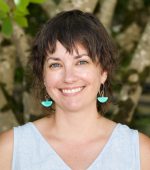
Kelly Monk
Oregon Health & Science University, The Vollum Institute, Portland, OR, USA
L02: Molecular and genetic mechanisms of glial cell development
Tuesday, 8 July 2025
Kelly Monk is a Professor and Co-Director of the Vollum Institute at Oregon Health and Science University (OHSU). After earning her B.S. degree in Biochemistry from Elmira College in 2001, Kelly pursued doctoral studies at the University of Cincinnati/Cincinnati Children’s Hospital under the mentorship of Nancy Ratner and was awarded her Ph.D. in Cell Biology in 2006. She did postdoctoral training in the lab of William Talbot at Stanford University School of Medicine. In 2011, she was appointed as an Assistant Professor in the Department of Developmental Biology at Washington University School of Medicine in St. Louis, and was promoted to Associate Professor with tenure in 2016. Monk joined the Vollum Institute in 2017 as Professor and Co-director and served as director of the Vollum/OHSU Neuroscience Graduate Program from 2017-2022.
Kelly has been instrumental in helping to establish zebrafish as a model to study glia, and her studies demonstrated that zebrafish and mammalian glia are remarkably similar. Kelly began her independent career in 2011 and has since gained recognition as a leader in the fields of glial cell biology and neuron-glial interactions. Over her career, she has leveraged the power of zebrafish genetics coupled with synergistic approaches in mouse, and her group is working to address key outstanding questions in glial cell biology and neuroscience including: glial fate specification and heterogeneity; the cell biology of myelination; mechanisms of glial-neuron and glial-glial interactions; glial support of neurons; and the contribution of glia to circuits and behavior.
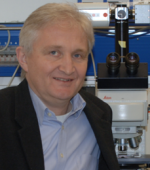
Klaus-Armin Nave
Max Planck Institute for Multidisciplinary Sciences, Göttingen, Germany
L03: The EMBO Keynote Lecture – Tbd
Wednesday, 9 July 2025
Klaus-Armin Nave obtained his PhD in 1987 from the University of California, San Diego, working at Scripps Clinic with Floyd Bloom and Greg Sutcliffe. After a postdoctoral stay at the Salk Institute with Greg Lemke, he became an independent research group leader in 1991 at the Center for Molecular Biology of the University of Heidelberg (ZMBH), where he was promoted to Full Professor in 1997. In 1999, he became Director of the Department of Neurogenetics at the Max Planck Institute in Göttingen (MPI-EM/MPI-NAT). His current research focusses on the discoveries of axonal control of myelination, glial support of axonal energy metabolism and the role of oligodendrocytes and myelin aging in neurodegenerative diseases.
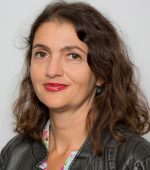
Nathalie Rouach
Collège de France, Neuroglial Interactions in Cerebral Physiology and Pathologies laboratory, Paris, France
L04: Tbd
Wednesday, 9 July 2025
Nathalie Rouach is a neurobiologist developing research on the role of glial cells in brain physiology and pathologies. She is a Research Director at Inserm. She received in 2002 her Ph.D. in Neuroscience, performed jointly at University Pierre and Marie Curie and the Weizmann Institute, where she studied the contribution of astrocytic gap junctional communication to neuroglial network interactions. She then joined the laboratory of Roger Nicoll at University of California San Francisco as a postdoc, where she worked on glutamate receptors trafficking and synaptic plasticity. She now runs the laboratory « Neuroglial Interactions in Cerebral Physiopathology and Pathologies » within the Interdisciplinary Center for Research in Biology at the Collège de France. Her lab aims at determining whether and how astrocytes play a direct role in information processing. In particular, her team explores the molecular modalities and functional consequences of neuron-glia interactions in various physiological and pathological contexts, such as critical periods, memory, social interactions, epilepsy or intellectual disability, with ex vivo and in vivo studies of neuronal excitability, synaptic transmission and plasticity, synchronization of neuronal networks, and behavior in mouse models or human tissues. She is a member of several scientific councils and has received several awards including the Human Frontier Career Development award, Silver Medal of the City of Paris, ERC Consolidator grant or ANR Chair of Excellence. She is the author of more than 100 publications in peer-reviewed journals.
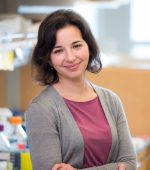
Anna Victoria Molofsky
University of California, Weill Institute for Neurosciences, San Francisco, USA
L05: Cytokines that shape brain development and plasticity
Thursday, 10 July 2025

Bart J.L. Eggen
University Medical Center Groningen, Department of BioMedical Sciences, Groningen, The Netherlands
L06: The shapes and states of microglia in the healthy and diseased human CNS
Friday, 11 July 2025
Bart Eggen received his MSc and PhD (1995) from the University of Utrecht. He obtained a Human Frontiers Science Program fellowship to work with Prof. Gail Mandel at the State University of New York and later with Prof. Ali Hemmati Brivanlou at the Rockefeller University in New York. In 2000, he joined the Department of Developmental Genetics at the University of Groningen, The Netherlands and in 2010, he moved to the Department of Neuroscience at the University Medical Center Groningen, The Netherlands. There his main research focus is on the regulation of microglia identity and function in the context of the normal brain, during aging and under neuroinflammatory or neurodegenerative conditions.
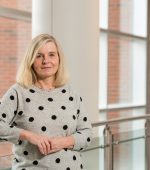
Maiken Nedergaard
University of Rochester Medical Center (URMC), Center for Translational Neuromedicine, Rochester, NY, USA
L07: The Glia-Lymphatic System
Friday, 11 July 2025
Professor Nedergaard is Dean’s Professor and Co-Director of the Center for Translational Neuromedicine at the University of Rochester Medical Center (URMC) in Rochester, NY, and Professor of Glial Cell Biology at the Center for Neuroscience at the University of Copenhagen (KU), Denmark. Her interests span from neuron-glia interactions in neural circuits to the sleep-wake cycle and the role of astrocytes in various diseases. She discovered the glia-lymphatic, or glymphatic system, and studied its physiological characteristics and how glymphatic dysfunction contributes to disease progression. Dr. Nedergaard is an elected member of the Royal Danish Academy of Sciences and Letters, the Royal Academy of Pharmacy of Spain, and Academia Europaea. She is the recipient of the Perl-UNC Neuroscience Prize, the Anders Jahre Prize, and the Nakasone Award.